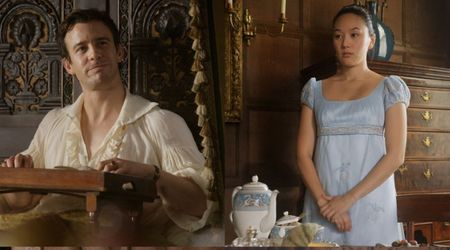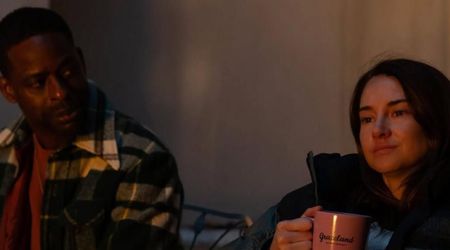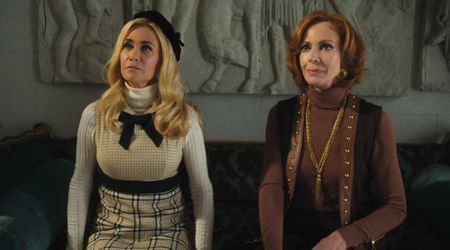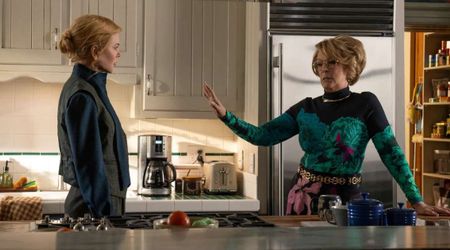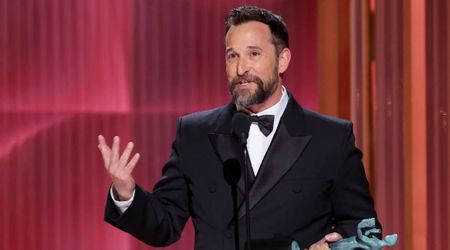Edward St Aubyn, the tortured soul who is the inspiration for Benedict Cumberbatch's new role in 'Patrick Melrose'

'Never Mind,' 'Bad News,' 'Some Hope,' 'Mother's Milk,' and 'At Last' make up The Patrick Melrose Novels, Edward St Aubyn's semi-autobiographical pentalogy that chronicle the protagonist's [read St Aubyn's] life as he grows up in a highly dysfunctional upper-class English family. The novels are considered by many critics to be one of the foremost literary masterpieces of the 21st century, with 'Mother's Milk' even being nominated for the Booker Prize in 2006.
It was announced in February 2017 that the novels would be made into a TV series in the form of a five-part co-production by Showtime and Sky Atlantic, with each episode based on a different novel in the pentalogy. If the books are anything to go by, expect it to cover a broad spectrum of narratives, including wealth, class, and a stinging commentary on the English public school system.

Benedict Cumberbatch, most well-known for his leading role in 'Sherlock,' was cast in the role of Patrick Melrose, the protagonist as he deals with his traumatic childhood by plunging himself into alcohol addiction and a heroin habit. But it's not all doom and gloom. Set for a release this coming May 12, the series also covers Melrose's recovery as he shuns his demons for marriage and parenthood.
Cumberbatch has not shied away from expressing his joy on landing the role, as well as his appreciation for the books, which he calls 'the most exquisite achievements in 21st-century prose.' The tragedy that was St Aubyn's childhood and early adult years helps give life to the show and though it is a part that he rarely revisits - there's little need considering how succinctly he has verbalized the story in his books - a brief look at the inspiration behind 'Patrick Melrose' paints the picture of a man who has conquered his vices but is still haunted by his past.
St Aubyn spent his formative years in London and France and was born into a family of privilege, but only in the loosest sense of the word. Though boasting of enviable riches and never left wanting, his childhood was a tortured one. Described in his semi-autobiographical novels are tales of the mind-numbing abuse he suffered at the hands of his father, Roger St Aubyn, a former soldier and surgeon of half-Scottish descent.
In his novels, he expresses this particular part of his life with the dry wit, amused disdain, and irony that has characterized his writing and set him apart in that all-too-new genre of 'misery memoirs' that are flooding the bookstores. However, the maltreatment he went through at such a young and impressionable age left him psychologically fractured and emotionally handicapped.
It didn't help that his own mother, Lorna, regarded the situation with a heavy dose of apathy and self-pity. A descendant of a wealthy American family based in Cincinnati, he revealed to the New Yorker that when he told her about the fact that his father had repeatedly raped him between the ages of five and eight, he was met with a disquieting response of 'Me too.' While his comments were not laced with contempt, per se, they did carry an undertone of disappointment.
He said she was 'very, very keen to jump the queue and say how awful it was for her,' but was still 'very keen to establish that she had no idea' about the sexual assaults, and 'didn’t even know such a thing existed.' His feelings for his mother, who he arguably holds equally responsible for his troubled childhood, were best summed up by the man himself. To him, she was a 'really was a person of good intentions, but if ever it was clear that good intentions were not enough.'
In the end, it was up to St Aubyn to take a stand for himself because he came to the depressing realization that his mother would not. So, at the age of just eight, he was forced to confront his then almost-60-year-old father and faced with the prospect of persuading him to stop. He succeeded.
Those early years are chronicled in the first novel of the series, 'Never Mind,' and in the second, 'Bad News,' he walks us through the lasting psychological impact it had on him as he tackled his unusually rough teens and 20s. St Aubyn spent those years in an endless battle with alcoholism and heroin addiction. It was a battle he was closer to losing than he would have liked.
In an attempt to escape his self-perceived depravity, he buried himself in his writing. He started his first novel when he was just 12, and continued to toil away at a succession of books all through those drug and alcohol-fueled years. He ended up abandoning every single one of them.
The lowest point in his life came when he attempted to take his own life at the age of 25. Luckily for him, he did not succeed, and that failure shocked him back into reality and set him on the road to eventual recovery. He realized that he needed therapy, and he even managed to get around to writing that novel which he had been putting off all these years. The novel which would go on to become the first in the now much-acclaimed Patrick Melrose series.
In every novel in the series since, he has mercilessly berated the patriarchal aristocracy that failed to protect him; in his own inimitable style, that is. The pentalogy concluded with the publishing of 'At Last' in 2011 and charts the final phase of his recovery and the death and funeral of his mother. He recognized that 'he had been a toy in the sadomasochistic relationship between his parents.'
Despite shunning most aspects of that aristocratic upbringing, there are still certain corridors that he still treads through, one of which is White's. The gentleman's club in St. James's, London, is the oldest - it was founded in 1693 - as well as the of the most exclusive of its kind. His father was a member back in his day and notable current members include Charles, Prince of Wales, Prince William, Duke of Cambridge, Conrad Black, and Tom Stacey.
For now, it seems show business is all too eager to cash in on the renewed hype accompanying St Aubyn's novels. 'Mother's Milk' was made into a full-length feature film in 2012, with St Aubyn providing the screenplay himself. Also jumping in on the trend is Rachael Horovitz, the producer of 'Moneyball' fame, who plans on adapting the pentalogy into a complete series of Melrose films for television; presumably one for every novel.
As for St Aubyn himself, the Patrick Melrose series is now behind him; at least, in a literary sense. He strongly insists that there will be no more of Patrick Melrose, though he said he's not against revisiting some of the other characters. Having given up his eccentric but tortured alter ego after the publishing of 'At Last,' the award-winning writer has since published two further novels: 'Lost for Words,' and 'Dunbar.'
The former is a satire on the business of literary prize-giving and quite possibly a subtle dig at his failure to be awarded the Man Booker Prize in 2006. It has been described by the Independent as 'a witty, often excoriating, riposte to the phenomenon and workings of major book awards.' The latter, a modern, darker, and more surreal take on Shakespeare's 'King Lear.' A cursory look at either is all it takes to realize that St Aubyn now incorporates his scathing, witty criticisms and commentaries in a much broader spectrum.

He says that marriage is not his cup of tea, and you can understand why. A marriage in his 20s did not work out for the best, and while he is the father of two children, Eleanor and Lucian, neither were conceived in wedlock. It doesn't bother him too much that he now lives alone. In fact, he seems to thrive on it, despite telling the Guardian in 2011 that as a writer, he needs solitude, but as a person, he craved companionship.
The New Yorker best put it when they described him as someone who gives the impression of 'being puzzled, and rather impressed, to find that he is not dead.' St Aubyn, however, seems to take great joy from the fact that his larger-than-life character/self-portrait has been brought to TV screens, though that was not initially the case.
He told FT in an interview that his initial reaction on being told that the books would be adapted to the small screen was anxiety: "It does look like a fishbone. You’ve handed in a fish, a thrashing, living fish, and you’ve been given back a fishbone. So initially it’s slightly alarming. But when I went down to the set, I saw why David [Nicholls] had done something brilliant."
As reported by Vanity Fair, he recently quipped: "I’ve spent 25 years being asked if I’m Patrick Melrose. So it’s a great deal of relief to be able to say, 'No, Benedict Cumberbatch is.'"




